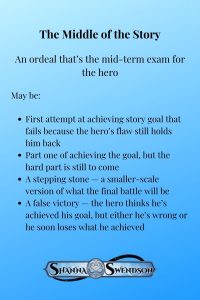writing
Fantasy Language
One thing that gets tricky about writing secondary-world fantasy set in the past is figuring out what to do about language. Since the story takes place in another world, you know the characters aren’t speaking modern English, so the author can be seen as translating the whole story so that people in our world today can read it. But how strict should that translation be? Do you go all-in and truly translate it into modern English, or do you try to keep some flavor of the time period the secondary world is based on?
For instance, the word “okay.” It didn’t come into use in our world until the 1800s, and only came into really common use in the 20th century. When I read that word in a fantasy novel set in a pre-modern setting, it throws me out of the story. And yet, if we’re going by the “it’s all being translated, anyway” idea, why not translate their word of agreement to “okay”? I don’t have an answer for this. I just try to avoid using it unless I’m writing contemporary works set in our world. Katie and Lexie say “okay,” Verity does not, and the heroine I’m currently writing doesn’t.
Then there are the things where the truth sounds wrong. For instance, “hello” is more modern than “hi.” “Hello” didn’t come into use until the 1800s when it was introduced as the way to greet people on the telephone. “Hi” dates to the middle ages and comes from an Old English word, “hy.” The Norwegian word is “hei,” and since there’s a lot of crossover between old Norse and Old English, I’m sure they’re related. But if I wrote a character in the 1600s saying “hi,” it would sound wrong and “hello” may sound right. The way I understand it, “hy” was more about getting attention than it was a greeting the way we say “hi” now.
The other tricky thing is common words that come from proper names. Like “sandwich,” which is named for a person. Can you use that term in a world where there was no Earl of Sandwich? An ottoman is named for the Ottoman Empire, which doesn’t exist in a secondary world. Does that fall under the “it’s all a translation” rule, or do you have to find another word? It’s really hard to find something else to call a sandwich without it getting awkward. The Norwegian word is smørbrød, which seems to translate literally to “butter bread,” and that doesn’t really say “sandwich” to me. And then there’s the metaphorical use of it, saying something is “sandwiched” between two other things.
Or there are words that come from technologies that don’t exist in that world. I had to stop myself from using the term “sidetracked” when my character was distracted because if there are no railroads, there shouldn’t be any concept of being sidetracked. I did once read a book set in a pre-industrial secondary world in which a character who was hiding out talked about staying under the radar, and I can’t believe the editor let that one go because that concept would have been totally foreign to the characters and I don’t think even the “it’s all a translation” idea works there.
Another issue is keeping the flavor of the language. If you’re basing your secondary world on, say, the early 17th century, you wouldn’t want to write your whole book in the style of the King James Bible if you want modern readers to actually be able to get through it. But you also wouldn’t want to translate it into language that’s too modern and casual. Your scheming prince saying, “LOL!” when something bad happens to his enemies would break the spell.
I once read an essay by someone who was a grand master in the field of fantasy complaining about a new author’s book that she thought sounded too modern and mundane (this author went on to be in the grand master category, but she was a young first-time author at the time the essay was written, so I think singling her out like that was a tacky move on the part of the more established author). She took a scene from the book in which a pair of noblemen who’d just left a council meeting were discussing the events and showed how she could change them to politicians who’d left a committee meeting by only changing the specific references. At the time I read that essay, I hadn’t read the grand master and was a fan of the newer author, so it made me mad, but even now as a reasonably experienced author, I think the grandmaster was wrong.
If you’re taking the “translated from that secondary world language for modern readers” approach, you’d stick with language that would be appropriate for the modern equivalent of the people depicted in the story. In that case, members of the royal council would equate to members of Congress, and therefore the fact that you could change the character names and titles and change “palace steps” to “Capitol steps” would be a sign that the author did it right. Where you’d have problems would be if you could change them to student council members and palace steps to school steps and it still works. Then your language might be too casual for a high fantasy.
I don’t think you need a lot of “hark” and “prithee” type language, but I think you can go too far the other way. There’s an author I’ve read recently whose characters and stories are great, but his use of language keeps taking me out of the story because he’ll have a medieval-equivalent chieftain say something like, “Okay, guys, we’ve gotta pull together on this.” Then again, that would possibly be the equivalent of a CEO in our world, and some of them do talk like that.
I don’t really have any firm answers. I just have to go by what feels right for the story, something that gives the flavor of another time and place but that’s still readable. I try to have “invisible” writing, where you don’t really notice the words. The words inject the story into your head, and you experience it that way without feeling so much like you’re reading. Part of that is using language that doesn’t draw attention to itself and that feels like a natural part of the story. I think for the book I’m working on, that will mean finding something else to call a sandwich, not letting a character get sidetracked and nobody saying “hello” or “okay.” Another author might make different decisions.


